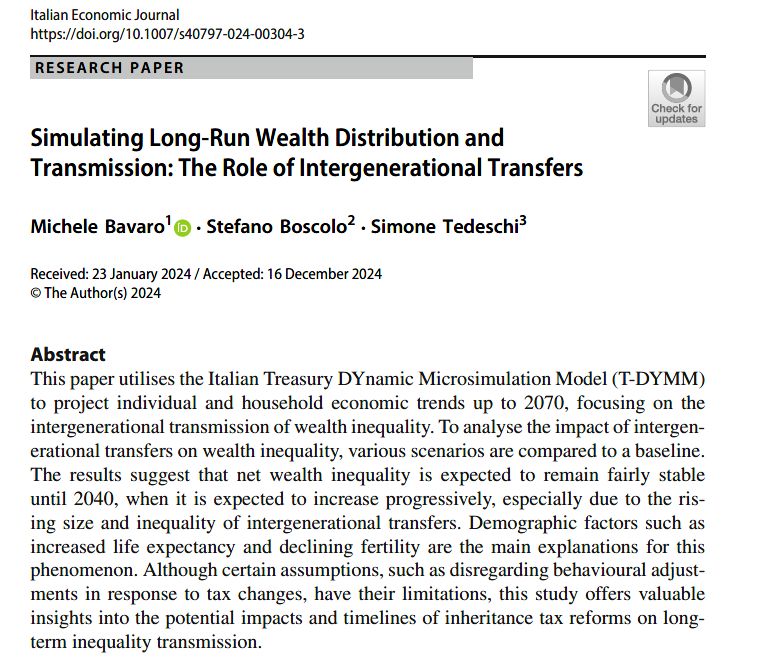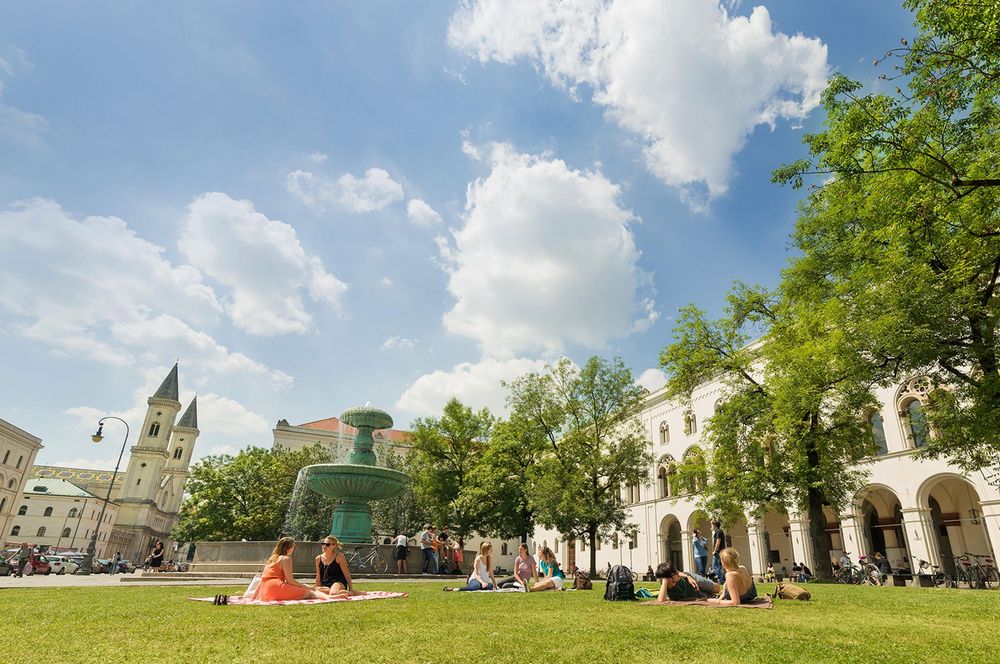
We're recruiting! Post-doctoral Researcher in Inequality, Social Policy and Social Mobility.
Deadline: 6 Feb 2026
We're hiring for a Post-Doctoral Researcher! Are you...
Close to the completion of / have completed a doctorate in a social science discipline?
A specialist in inequality, social policy, or social mobility?
Experienced in data management and analysis?
If so, apply:
https://ow.ly/Uzse50Y15Gz
23.01.2026 10:00 — 👍 5 🔁 10 💬 0 📌 0
The Necks are having a three-day residency at Cafe OTO again this April!
16.01.2026 10:37 — 👍 1 🔁 0 💬 1 📌 0
Join our team at DSPI Oxford!
What you’ll find here:
- Fair workload with substantial time for research
- Supportive colleagues
- Motivated students
- A vibrant research environment
- Support for worker visa application
Feel free to reach out with any questions.
27.10.2025 16:23 — 👍 2 🔁 0 💬 1 📌 0
NEW research from @sbeduk.bsky.social finds that UK families lose nearly a fifth of income after job loss - far more than in other EU countries ⬇️
The findings suggest the need for stronger unemployment support.
27.10.2025 09:34 — 👍 5 🔁 2 💬 1 📌 0

Vacancies
Jobs and Vacancies at INET Oxford, The Institute for New Economic Thinking at the Oxford Martin School, University of Oxford
Join us at INET Oxford (@inetoxford.bsky.social)! I'm hiring one post-doctoral researcher and three research assistants in the field of inequality, social policy, and social mobility to join our research team. Deadline: October 24. Read more and apply: www.inet.ox.ac.uk/vacancies
08.10.2025 07:55 — 👍 24 🔁 16 💬 1 📌 1

🚨 New pre-print with @sergioloiacono.bsky.social
We ran 3 large-scale experiments in 🇬🇧to investigate how perceived asylum-seeking legality, public preferences for refugee relocation, and inclusionary attitudes are shaped by symbolic and strategic boundaries
doi.org/10.31235/osf...
11.09.2025 09:32 — 👍 21 🔁 8 💬 2 📌 0
Many congrats again! Excited to have you back in Oxford.
14.07.2025 19:59 — 👍 1 🔁 0 💬 0 📌 0

Kicking off our (15th) annual Low Pay Britain report, @nyecominetti.bsky.social starts with the really good news - (hourly) low pay has been virtually eliminated.
It's fallen from a fifth of the workforce 15 years ago, to just 3.4% today (and 1% for workers aged 25 and over).
03.07.2025 08:37 — 👍 5 🔁 1 💬 1 📌 1

DIW Berlin: Researcher (f/m/x)
We are hiring a 3-year postdoc for the ERC-funded WEALTHTRAJECT project at DIW Berlin. More details here: www.diw.de/sixcms/detai...
13.06.2025 13:51 — 👍 43 🔁 40 💬 0 📌 1
Wow!
01.06.2025 17:48 — 👍 0 🔁 0 💬 0 📌 0

Hurrah: write-up of my Ruggles Lecture (with @mikebrewerecon.bsky.social and @nyecominetti.bsky.social) now out in Review of Income and Wealth, Open Access at onlinelibrary.wiley.com/doi/10.1111/....
ICYMI: our companion report at www.resolutionfoundation.org/publications...
14.04.2025 12:26 — 👍 16 🔁 10 💬 0 📌 1

Our analysis shows that public service provision is redistributive in general, providing
substantial in-kind support for lower-income households. For example, households in
the lowest income quintile receive an average of £15,900 per year in in-kind benefits each
year – 53 per cent more than the £10,400 received by the highest-income household
quintile (Figure 4). As a share of income, the lowest-income households receive in-kind
benefits worth 61 per cent of their income on an equivalised basis, while in-kind benefits
are worth just 4 per cent of incomes for the highest income decile
Public services are highly re-distributive to lower-income households.
Households in the lowest income quintile receive an average of £15,900 per year in in-kind benefits.
Read more ➡️ buff.ly/58qMKUI
09.04.2025 15:34 — 👍 9 🔁 2 💬 0 📌 0
ESPANET 2025
University of Milan, 27th-29th August 2025
Call for papers for ESPAnet #socialpolicy conference in Milan open until 24/4. We are chairing again a stream on #poverty and #inequality together with @zparolin.bsky.social @danieledmiston.bsky.social and @sbeduk.bsky.social.
✉️🖨️ www.espanetmilano2025.it/en-US/stream...
02.04.2025 06:34 — 👍 8 🔁 7 💬 0 📌 0

Chart showing proportion of children living in relative poverty, after housing costs: GB/UK
The trend over time suggests that child poverty is set to increase further
The latest data suggests child poverty and food insecurity have been rising for three consecutive years.
While there are some questions about the reliability of the data, the big picture trend and forecast also remain bad.
01.04.2025 12:02 — 👍 17 🔁 7 💬 1 📌 0
Re-upping this for we know so much about the harms of benefits cuts. Yet onto Labour-led ones..
The focus should be on abolishing the two-child limit and the benefit cap *for a start*, not on slashing PIP and Universal Credit.
Hardship has social, economic and health costs. So much for "savings".
21.03.2025 14:26 — 👍 7 🔁 4 💬 0 📌 0
This morning the justice secretary pointed to a “huge rise in the welfare budget” as justification for targeting benefit spending to make fiscal savings. So how big has the rise in welfare spending been?
05.03.2025 17:31 — 👍 26 🔁 20 💬 1 📌 7

Keeping SNAP in Line with Global Evidence on Food Security | NEJM
Proposals to introduce nutrition-based restrictions in SNAP ignore a global movement
away from this kind of welfare program administration and toward systems that can
more effectively improve health.
#SNAP is already globally unusual as an antipoverty program. Cash-like, just for non-prepared foods, at approved retailers.
Evidence from cash transfer programs suggests there are easier ways to protect #foodsecurity.
🛟 🩺📊 🩺 #econsky #academicsky
10.09.2024 16:08 — 👍 23 🔁 7 💬 3 📌 2

Chart showing real full-time annual earnings for someone on the minimum wage and different categories of graduates: UK
Graduate salaries have stagnated while the minimum wage has risen, leading to convergence between the two.
Two decades ago, the median graduate in a ‘graduate job’ had a salary 2.5 times that of a minimum wage worker, by 2023, the typical graduate earned 1.6 times a minimum wage worker.
15.02.2025 15:58 — 👍 10 🔁 5 💬 2 📌 0

Hello BlueSky world!
I want to share with you a new work published on ITEJ with S. Boscolo and S. Tedeschi.
link.springer.com/article/10.1...
We study the looking forward trends in wealth inequality in Italy with a dynamic micro-simulation model.
Please see below for more details!
👇👇👇
10.02.2025 08:56 — 👍 14 🔁 6 💬 1 📌 0

Picture of the main campus of the LMU Munich with students sitting on the grass and talking
Sociologists working on inequality:
Still time to apply for this 3yr+ postdoc position in beautiful Munich (no German required)
EN: job-portal.lmu.de/jobposting/5...
DE: job-portal.lmu.de/jobposting/f...
Applications are 01/15, but let me know if you need another 1-2 days to put in your materials
14.01.2025 09:38 — 👍 85 🔁 82 💬 2 📌 3

How important are inheritances in terms of total income into a household? Perhaps surprisingly, gifts and inheritances are only a small proportion. Thus, inheritance taxes may have little effect on inequality.
19.12.2024 07:00 — 👍 4 🔁 2 💬 0 📌 0

Now by sector, elite colleges are more concentrated for corporate and NGO positions than for billionaires and international orgs.
But for country leadership (central bankers and heads of state), the distribution is much more mixed, and Oxford edges out Harvard. (Yale still DNF)
06.12.2024 19:12 — 👍 36 🔁 7 💬 2 📌 1
3-year Postdoc Opportunity in the DECIPHE project at DIW Berlin.
You'll work closely with P. Lersch and collaborate with the team to study intergenerational persistence of homeownership in Europe.
Deadline: 15 Jan 2024
For job details: www.diw.de/sixcms/detai...
For DECIPHE: www.deciphe.eu
29.11.2024 12:25 — 👍 7 🔁 5 💬 0 📌 0
I would also happy to be added.
17.11.2024 20:10 — 👍 3 🔁 0 💬 1 📌 0
Postdoctoral Prize Research Fellow in Sociology at @NuffieldCollege @UniofOxford | social integration, voluntary organizations, residential segregation, intermarriage
Nuffield College, Oxford
Co-Director, British Election Study
Director, Nuffield Politics Research Centre
President, British Polling Council
Voting, surveys, explanation, singing …
Fighting every day to deliver a city that working New Yorkers can actually afford. Mayor of New York City.
Professor of economics at George Mason University, fellow at the Peterson Institute of International Economics, IZA, CReAM/UCL, CEPR, CGD. Associate Editor JEP. USAID 2021–2024. Personal views exclusively.
Web: http://mclem.org
ORCID: 0000-0003-1354-0965
Nuffield Postdoctoral Prize Research Fellow in Sociology.
Environment | Fertility & Reproductive Health | Early Life Exposures
📍Nuffield College, Oxford @nuffieldcollege.bsky.social & Leverhulme Centre for Demographic Science @oxforddemsci.bsky.social
The Economic Statistics Centre of Excellence (ESCoE) is a research centre hosted at King's College London and supported by the ONS.
We provide research on economic statistics for the modern economy. 📈
The Institute for Analytical Sociology (IAS) at Linköping University conducts big-data influenced research on important social, political, and cultural matters.
https://liu.se/en/organisation/liu/iei/ias
Professor of Sociology, University of Essex | Deputy Director @misoc-essex.bsky.social | migration & ethnic inequalities in education, work, health and access to justice
Postdoc LIVES Centre, University of Lausanne.
https://aliciagarciasierra.github.io/
Assistant Professor in the School of Politics and Int'l Relations (SPIRe) at University College Dublin
PhDing @dspi-oxford.bsky.social | politics, ethnic identity/fluidity, health inequalities | victoriaxltan.wordpress.com | 🇲🇾🇨🇦 in the 🇬🇧
Postdoc @ Uni Siegen, Political Economy | Interested in all political sociology and political economy | before: Unis Duisburg, Oxford & Mannheim + Politics
The reference journal for Italian and international scholars interested in Southern European Welfare States. Supported by http://espanet-italia.net
https://www.mulino.it/riviste/issn/2284-2098
🇪🇺🦔🦡🌹🕊Emeritus prof of medical sociology UCL. Posting on social inequality in health , work & health, commercial & political determinants of health. Relationship between research & policy. Sometimes post about badgers, trams & trains. Oublagea
Founder of Tax Policy Associates Ltd. Tax realist. @danneidle on Twitter
Social policy researcher (though sometimes pretends to be a philosopher), Prof co-leading WelfareExperiences project and kcl.ac.uk/csmh work & welfare strand. Was at @BenBaumberg at the other place.
Economist at the IFS (@theifs.bsky.social). Interested in firms, productivity, markets, management and growth. Previously at the CMA, ONS, Nuffield College Oxford. All views my own.
www.jakobschneebacher.com
Data Journalist at the FT
https://www.ft.com/amy-borrett
Companion blog to the Journal of Social Policy, Social Policy & Society, and the Journal of International & Comparative Social Policy, published by Cambridge University Press for the Social Policy Association.





















